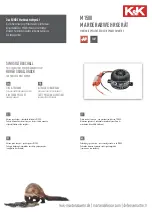
3_]]e^YSQdY_^cQ^T9?
=UTGU\T# %?`UbQd_bµc7eYTUD)## "
#%
= #" "%1`bY\" "
'LVFUHWH,QWHJUDWLRQ
The discrete interface (DIO) scheme allows the weld control to
exchange data points with any automation system.
For further information, refer to “Discrete Input Modules” on
page 1-13. To make these inputs available to the weld processor,
and to allow the MedWeld 3005 to activate the outputs, wire into
the discrete I/O modules in the controller rack.
,2'HILQLWLRQV
>?D5*
This chapter defines all possible I/O. Your weld processor may not
provide all of this I/O, based on the requirements of your application.
Refer to the drawing packet provided for your exact I/O availability and
designations.
,QSXWV
BINARY SELECT Inputs (#1, #2, #4, #8 & #16)
These inputs select the schedule to be initiated (1 – 31). The
schedule is selected by a combination of these inputs. Each
input has a weighted value (1, 2, 4, 8 or 16). The schedule
initiated is the one selected by adding the weighted values of
the active inputs.
For example, to initiate schedule #4, activate BINARY
SELECT Input #4. To initiate schedule #7, activate BINARY
SELECT Inputs #1, #2, and #4 (because 1 + 2 + 4 = 7).
WELD ENABLE Input
When this input is activated, the weld control executes the
schedule that was selected by the BINARY SELECT Inputs.
>?D5*
If your application does not use this input, the control uses a two-cycle
timed delay to determine when all of the inputs are active. (After
receiving a BINARY SELECT or PARITY Inputs, the control delays for
two cycles to assure that all of the desired inputs have become active.)
Summary of Contents for MedWeld 3005
Page 2: ...YY UTGU T UbQd_bµc 7eYTU V_b D 1 bY ...
Page 84: ...3_ e YSQdY_ c Q T 9 UTGU T UbQd_bµc 7eYTU D 1 bY ...
Page 110: ...GU T CSXUTe Uc UTGU T UbQd_bµc 7eYTU D 1 bY ...
Page 126: ...1TfQ SUT C_VdgQbU 6UQdebUc UTGU T UbQd_bµc 7eYTU D 1 bY ...
Page 144: ...CUde QbQ UdUbc UTGU T UbQd_bµc 7eYTU D 1 bY ...
















































